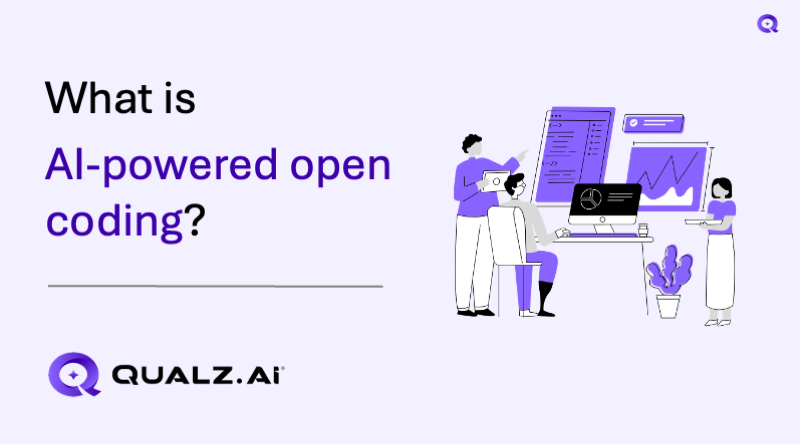Before we explore AI’s role, let’s unpack the foundational concept: open coding.
In qualitative research, open coding is the process of labeling concepts, themes, or ideas found within raw data (such as interviews, focus groups, or open-ended survey responses). It’s a crucial step in grounded theory and thematic analysis. Traditionally, researchers comb through data line-by-line, assigning codes that represent emerging themes.
Topics Covered
ToggleWhile essential for building robust insights, manual open coding is
- Time-Intensive: Hours or days per dataset
- Mentally Draining: Prone to fatigue-related error
- Subjective: Vulnerable to researcher bias
This is where artificial intelligence enters the frame.
What is AI-Powered Open Coding?
AI-powered open coding automates the coding process using natural language processing (NLP) and machine learning. These systems identify meaningful phrases, categorize responses, and even suggest hierarchical relationships without hours of manual labor.
Platforms like Qualz.AI are pioneering this field by embedding AI directly into the qualitative research pipeline. The AI reads through transcripts or text data, pinpoints key patterns, and generates thematic codes in seconds.
How It Works:
- Upload Your Data: Transcripts, survey responses, or existing documents.
- Automatic Parsing: AI analyzes the linguistic structure of each sentence.
- Thematic Tagging: Recurring concepts are tagged and clustered into initial codes.
- Code Categorization: Codes are organized into themes and subthemes for easy interpretation.
- Visual Dashboards: View your results using treemaps or Sankey diagrams.
How Academics Can Benefit from AI-powered Coding
While the corporate world quickly adopts AI in research, academia has only begun to scratch the surface. Here’s why you should consider integrating AI-powered coding in your next qualitative study:
Save Weeks of Work
What previously took dozens of hours can now be done in minutes. AI eliminates the tedious first-pass review, freeing your time for deeper analytical thinking.
Enhance Objectivity
AI models apply consistent logic across datasets. This reduces human error and helps eliminate unconscious bias, making your research more credible.
Scale Your Research
Whether analyzing 10 interviews or 10,000 open-ended responses, AI-powered tools like Qualz.AI can scale effortlessly without loss in quality.
Real-World Academic Applications
Here’s how academic researchers are using AI-powered open coding:
- Educational Research: Analyzing student reflections and teacher interviews to identify pedagogical themes.
- Healthcare Studies: Coding patient narratives to discover treatment impact and emotional response patterns.
- Sociological Research: Identifying trends in large-scale survey responses on social behaviors.
- Policy Research: Processing public comments and stakeholder feedback in policy evaluations.
Conclusion
AI-powered open coding isn’t just a tech trend it’s a leap forward in academic rigor and research efficiency. For scholars overwhelmed by data volume or constrained by time, this tool offers an elegant solution: more insight and less effort. Whether you’re a doctoral candidate analyzing dissertation interviews or a professor managing multiple research projects, integrating AI into your qualitative workflow can transform your work processes. If you’ve ever felt overwhelmed by the volume of qualitative data in your research or found yourself sacrificing depth for speed, now is the perfect time to experiment with a smarter, scalable solution. Qualz.ai is built specifically for academic researchers who value methodological rigor but need more efficient tools for growing data demands.
Whether you’re working on a thesis, managing a funded study, or guiding students through analysis, Qualz.ai streamlines the coding process without compromising academic integrity.
Try Qualz.ai for free now!
